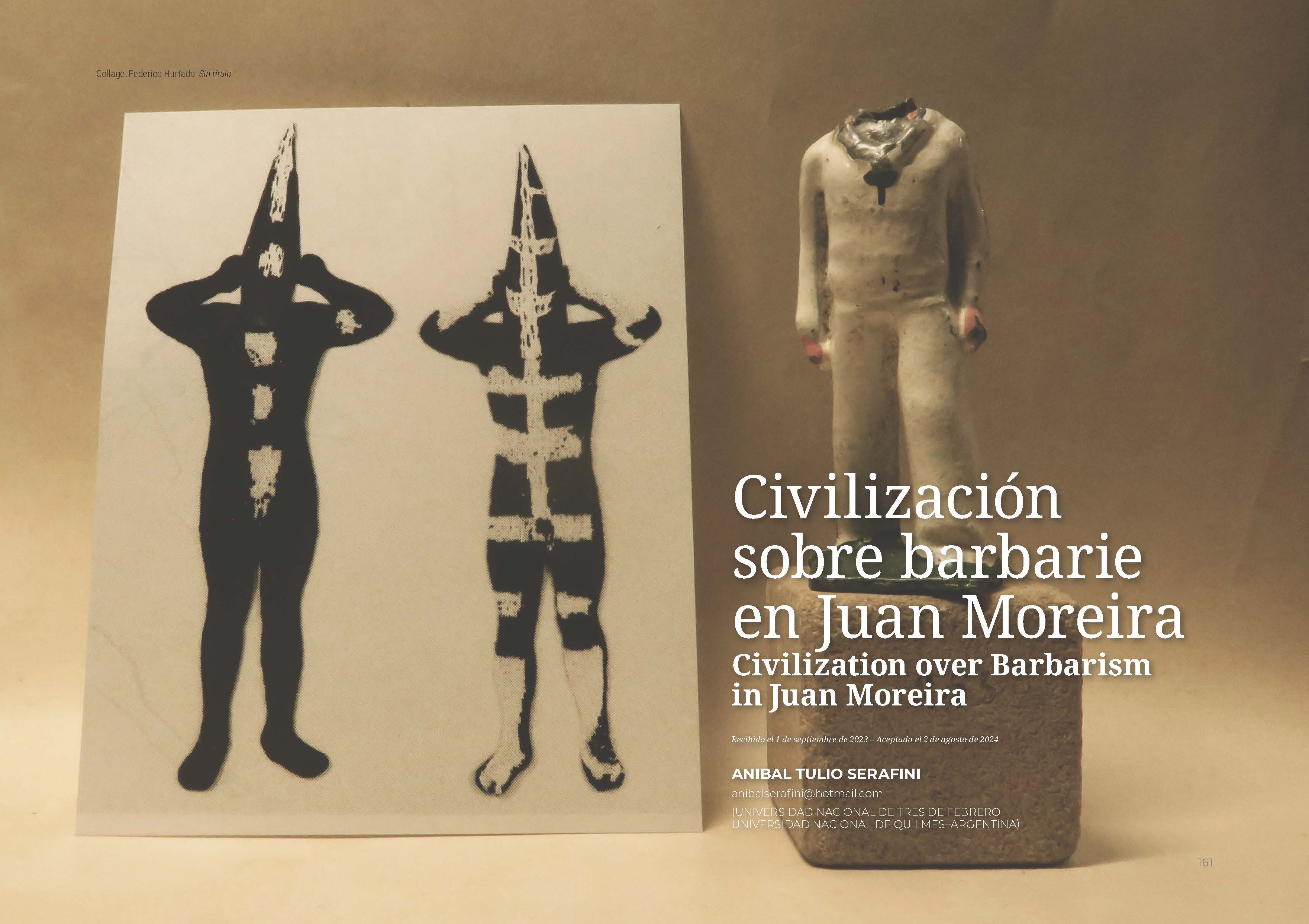Civilización sobre barbarie en Juan Moreira
DOI:
https://doi.org/10.69498/ri.2024.20.445Palavras-chave:
Civilización, Mito, Literatura, EstadoResumo
Este trabajo propone analizar y discutir la construcción de sentido que, desde cierta noción de civilización asociada al mito político civilización y barbarie, se volvió preeminente en el período histórico argentino constitutivo del Estado nacional moderno entre mediados y finales del siglo XIX. Entendiendo que el rol del mito consiste en asignar sentido a la organización de la realidad donde se despliega, la influencia de esta noción de civilización pareció impregnar la dimensión cultural de la época en general influyendo en las ideas, argumentos y relatos políticos, económicos y sociales, como así también en las expresiones literarias y artísticas. Para exponer esta instancia operativa del mito político y de la noción de civilización devenida del mismo se ha seleccionado, particularmente, la obra de época Juan Moreira, publicada en el diario porteño La Patria Argentina, propiedad de la familia Gutiérrez, entre el 28 de noviembre de 1879 y el 8 de enero de 1880. Se plantea así la posibilidad de que esta obra expresara, tanto en su sentido general como en la caracterización de sus personajes y escenarios simbólicos, múltiples nociones arraigadas a una idea preeminente de civilización que podía pensarse en la época como universal y natural, además de cerrada a otro tipo de interpretaciones.
Downloads
Referências
Adamovsky, Ezequiel, El gaucho indómito. De Martín Fierro a Perón, el emblema imposible de una nación desgarrada, Buenos Aires, Siglo XXI, 2019.
Bunge, Carlos Octavio., El derecho en la literatura gauchesca, Buenos Aires, Biblioteca Virtual Universal, 2003. URL: https://biblioteca.org.ar/libros/8718.pdf. Consultado el 19 de julio de 2023.
Chicote, Gloria, "De gauchos, criollos y folklores: los conceptos detrás de los términos" en Anales de Literatura Hispanoamericana [en línea], N° 42, 2013, pp. 19-34, URL: http://www.memoria.fahce.unlp.edu.ar/art_revistas/pr.9015/pr.9015.pdf. Consultado el 20 de julio de 2023.
https://doi.org/10.5209/rev_ALHI.2013.v42.43652
Fos, Carlos, "En las fronteras de la civilización y barbarie. La gauchesca o la lucha por la conformación del universo mítico nacional", en Stichomythia [en línea], N° 11 y 12, 2011, pp. 16-27. URL: https://parnaseo.uv.es/Ars/stichomythia/stichomythia11-12/pdf/estudio_2.pdf. Consultado el 19 de Julio de 2023.
Gutiérrez, Eduardo, Juan Moreira, 2014. URL: https://freeditorial.com/es/books/juan-moreira. Consultado el 18 de Julio de 2023.
Kusch, Rodolfo, "La encrucijada de estar no más", en El pensamiento indígena y popular en América, Obras completas, Tomo II, Buenos Aires, Editorial Ross, 2000.
Laclau, Ernesto, Nuevas reflexiones sobre la revolución de nuestro tiempo, Buenos Aires, Ediciones Nueva Visión, 1990.
---, Misticismo, retórica y política, Buenos Aires, Fondo de Cultura Económica, 2000.
Moyano, Marisa, "Escritura, frontera y territorialización en la construcción de la nación", en Revista Ciber letras, [en línea], N° 9, 2003. URL: https://dialnet.unirioja.es/servlet/articulo?codigo=716338. Consultado el 18 de julio de 2023.
Noguera, Lía y Forgnone, Juan Cruz, "Juan Moreira (1886) de Eduardo Gutiérrez y José Podestá", Revista Teatro XXI [en línea], N° 34, 2018, pp. 84. URL: http://revistascientificas.filo.uba.ar/index.php/teatroxxi/article/view/5117/4631. Consultado el 18 de Julio de 2023.
Palti, Elías, "Los poderes del horror: Facundo como epifórica", en Revista Iberoamericana, Vol. LXX, N° 207, 2004, pp. 521-544. Palti,
https://doi.org/10.5195/reviberoamer.2004.5565
---, "Facundo y la «ansiedad de las influencias»", en Boletín del Instituto de Historia Argentina y Americana "Dr. Emilio Ravignani", Tercera serie, Nº 44, 2016, pp. 194-200.
Prieto, Adolfo, El discurso criollista en la formación de la Argentina moderna, Buenos Aires, Editorial Sudamericana, 1988.
Rezende de Carvalho, Eugênio, "La utopía identitaria en Argirópolis de Domingo F. Sarmiento" en Tabula Rasa [en línea], N° 21, 2014, pp. 247-265. URL: https://www.redalyc.org/articulo.oa?id=39633821013. Consultado el 18 de Julio de 2023.
https://doi.org/10.25058/20112742.13
Rinesi, Eduardo, Restos y desechos: el estatuto de lo residual en la política, Buenos Aires, Caterva Editorial, 2019.
Svampa, Maristella, El dilema argentino. Civilización o barbarie, Buenos Aires, Taurus, 2006.
---, "Civilización o Barbarie: de «dispositivo de legitimación» a «gran relato»", presentación en Seminario de mayo. 200 años de historia argentina, el difícil proceso de construcción de una nación, Centro Cultural Haroldo Conti, Secretaría de Derechos Humanos, 2010. URL: https://maristellasvampa.net/archivos/ensayo48.pdf. Consultado el 21 de Julio de 2023.

Downloads
Publicado
Como Citar
Edição
Seção
Licença
Copyright (c) 2023 Aníbal Serafini

Este trabalho está licenciado sob uma licença Creative Commons Attribution-NonCommercial-ShareAlike 4.0 International License.








